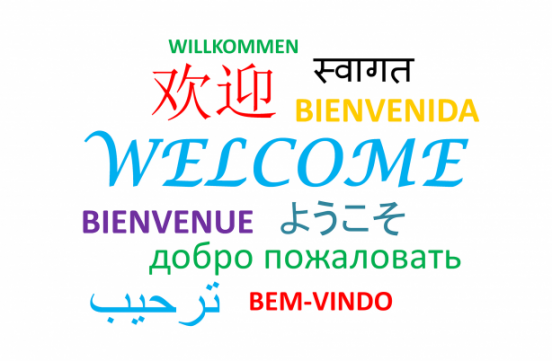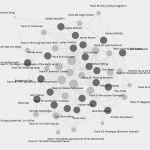Does language shape the way we think?
There are times that I find that my Canadian friends would laugh at certain jokes that my Chinese friends wouldn’t. I always knew something was missing there, and of course, I assumed it was the differences in language but just assumed. Dr. Boroditsky’s lecture has provided evidence of how language shapes our way of thinking with eye-opening examples.
“How we think about numbers” (33:59) is one of the examples she had shared in the lecture, which reminded me of one email I got from a former student about mental calculation.
My student was curious about how the numbers were read to the kids in the video. He emailed me and asked:
What I’m trying to figure out is how the numbers are being read to the children.For example is it spoken;“six hundred eighty seven”“six eighty seven”“six eight seven”
- “shi” (十) means two digits (also our number 10). So 64 would be “liu shi” si (六十四) as the 6 being two digits and 4 being one.
- “bai” (百) means three digits. So 654 would be “liu bai wu shi si” (六百五十四).
- “qian” (千) means four digits – “thousand” in English. So 6545 would be “liu qian wu bai si shi wu” (六千五百四十五).
- “wan” (万) means ten thousand.
- When the number is greater than ten thousand (万 “wan“), we use shi again, so “shi wan” (十万) is a hundred thousand, “bai wan” (百万) is million, “qian wan” (千万) is ten million.
- When the number is greater than ten million (千万”qian wan“) we use “yi” (亿), so one billion would be (十亿) “shi yi.”










MandyAlves
September 19, 2021 — 8:38 am
Ping,
Great point, there are so many ‘inside jokes’ within language and culture. Often these jokes don’t effectively transfer, this could be because of language itself, of the cultural context.
ping cao
October 3, 2021 — 11:43 pm
Totally Mandy! I love to watch stand up comedian but honestly, I could only get 80% of most of the shows even if I understand every English word 😉
james martin
September 30, 2021 — 6:28 pm
Hi Ping,
Thank you for explaining how numbers work in Chinese and talking about how the structure influences how numbers are understood due to the way they are named and written.
Your breakdown made me remember something about the way in which some numbers in French are named, which makes me wonder how it might affect how native French speakers think about and approach math with certain numbers.
Below the number 70, the structure of French number-words is mostly similar to English. The French word “vignt” (twenty) can be used as a stand-alone word for 20, or combined with another number to signify an additional digit in the ones place: “vignt-trois” is an identical construction to “twenty-three” in English. The same can be done with the words for 30 (trente/thirty), 40 (quarante/fourty), 50 (cinquante/fifty), and 60 (soixante/sixty) in both languages.
But unlike English, French does not use unique words to name 70, 80 and 90. Instead, the French names for these numbers are constructed using the names of smaller numbers in a way that suggests these sums are to be “counted” differently. The French word for 70 is “soixante-dix”, or literally “sixty-ten”, 71 is “soixante-et-onze” (“sixty-and-eleven”), and this new pattern of number naming in base-20 continues up to 79 (“soixante-dix-neuf”, or “sixty-nineteen”)
In French, the word for 80 is “quatre-vingts”, or literally (“four-twentys”). The name has multiplication built into its construction! So to say 84, “quatre-vingt-quatre”, one is literally saying “four-twenty-four” while implying the meaning of “four twenties plus four”.
Again, 90 does not have its own unique number name, and so the numbers are counted similarly to those in the 70s as if in base-20, with 99 being named “quatre-vingt-dix-neuf”, literally “four-twenty-ten-nine”, to be interpreted as “four twenties and nineteen” (or even as “four twenties and ten and nine” since the french word for nineteen, “dix-neuf” is literally “ten-nine”… not unlike how English’s “nineteen” evolved from “nine-ten”!)
I wonder if this convention for naming numbers makes certain types of calculations easier or more challenging for someone who grew up learning numbers this way?
ping cao
October 3, 2021 — 11:27 pm
This is such a fun example! I wonder the same thing 😉
If reading the number itself is actually adding items up, all they do, for example, “4*20 + 4,” would literally be translating the reading into numbers (so probably no calculation involved). However, if it is “30+30+20+4”, they will likely have to do math instead of a direct translation.
By the way, a friend of mine who is a MET alumni read this blog and messaged me, “there are some dialects of French that have words for seventy, eighty, etc instead of using a combination of previous numbers. For example, 70: soixante-dix (sixty-ten) or septante; 80: quatre-vingt (four twenty) or octante;). Maybe among all french speaking people, there are different ways of doing math because their different dialects treat numbers differently? This is such an interesting topic!
james martin
October 18, 2021 — 5:24 pm
Hi Ping,
I was unaware that numbers are named differently in some French dialects, that is super fascinating! Now I am curious to investigate the number conventions of Latin and other related languages in the romance family and see which way they tend to go.
I just remembered that English can also have the 4*20 construction to denote 80. I’m not sure just how widely used it was, but it was apparently common enough to be included in Abraham Lincoln’s Gettysburg Address, which opens with “Four score and seven years ago”, with score meaning twenty, so 4*20 + 7 = 87 years ago.